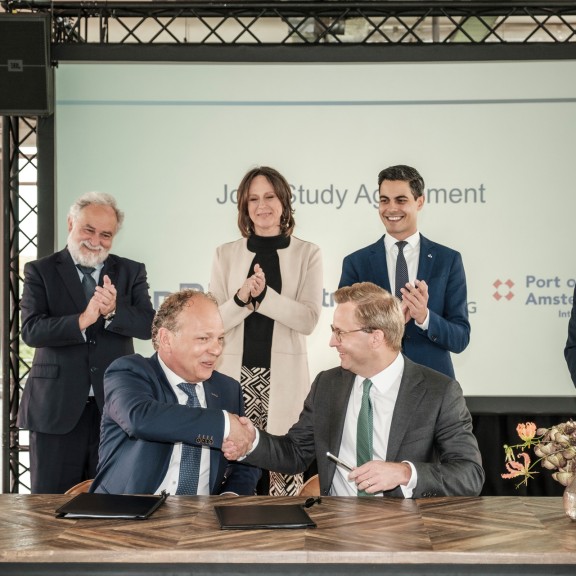
Development of green hydrogen corridor Bilbao and Amsterdam enters new phase
Together with our international partners, we signed two new agreements that herald a next phase in the development of a corridor between the Spanish port of Bilbao and the port of Amsterdam for green hydrogen and hydrogen derivatives.
The new agreements follow the previously signed partnership between Port of Amsterdam, Port of Bilbao and several other partners in June last year.
Joint Study Agreement for liquid hydrogen transportation
The first agreement entails a Joint Study Agreement (JSA) between Petronor, EnBW, GasLog and Port of Amsterdam. Under the JSA, the partners will jointly evaluate the technical feasibility and commercial viability of a liquid hydrogen corridor between the ports of Bilbao and Amsterdam. The goal is to develop an energy efficient and zero carbon emission, liquid hydrogen handling chain, which can safely, efficiently and cost effectively deliver commercial quantities of Petronor-produced hydrogen to the port of Amsterdam. GasLog, a Greek fleet owner and operator, is currently developing specialised vessels for the transportation of liquefied hydrogen, while EnBW and Port of Amsterdam work on the mobilisation of offtakers located in the North Sea Canal Area.
Memorandum of Understanding on e-SAF
The second agreement constitutes a Memorandum of Understanding (MoU) between Petronor/Repsol, KLM and Port of Amsterdam. This cooperation focuses on exploring the possibilities for the production of SAF (synthetic aviation fuel) and e-SAF (hydrogen-based synthetic aviation fuel) in Bilbao, with Repsol as the producer and KLM as the potential offtaker. Petronor and Repsol are building one of the world’s first e-SAF demonstration plants in Bilbao, together with Aramco. The current planning is for this plant to come online early 2026. With KLM committed to furthering its position as an industry leader in sustainable aviation and Air France-KLM being the largest user of sustainable aviation fuel globally, e-SAF could be one of the first hydrogen-based products moved along the Bilbao-Amsterdam corridor.
Agreement between Evos-CEPSA
Besides these two agreements, Port of Amsterdam also welcomes the signing of a third agreement. Evos, one of the biggest storage terminals in the port of Amsterdam, has agreed to an MoU with the Spanish company CEPSA. Both parties will explore the opportunities for transporting hydrogen via several vectors from the south of Spain, where CESPA will produce hydrogen. In the port of Amsterdam, Evos is focusing on transport via Liquid Organic Hydrogen Carriers (LOHC), where hydrogen is bound to another compound for efficient transport. One of the two Evos terminals in Amsterdam will use its existing storage tanks to receive and store LOHC in the near future.
Significance of intra-European corridors
Hydrogen plays an important role in the transition to non-fossil and in reducing CO2 emissions. Due to its natural characteristics, the Netherlands will not be able to produce enough hydrogen to satisfy expected demand. Port of Amsterdam is therefore committed to fostering strong ties with countries and partners able to produce commercially viable volumes of hydrogen and hydrogen derivatives. Significant value is placed on intra-European corridors, tying into the ambition of the European Union to strengthen energy security within the economic block, and leveraging transportation periods to reduce cost. The collaboration between Port of Bilbao and Port of Amsterdam is a perfect example of the potential such intra-European corridors hold, with strong bilateral ties translating to strong commercial connections and public support.